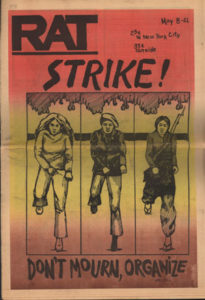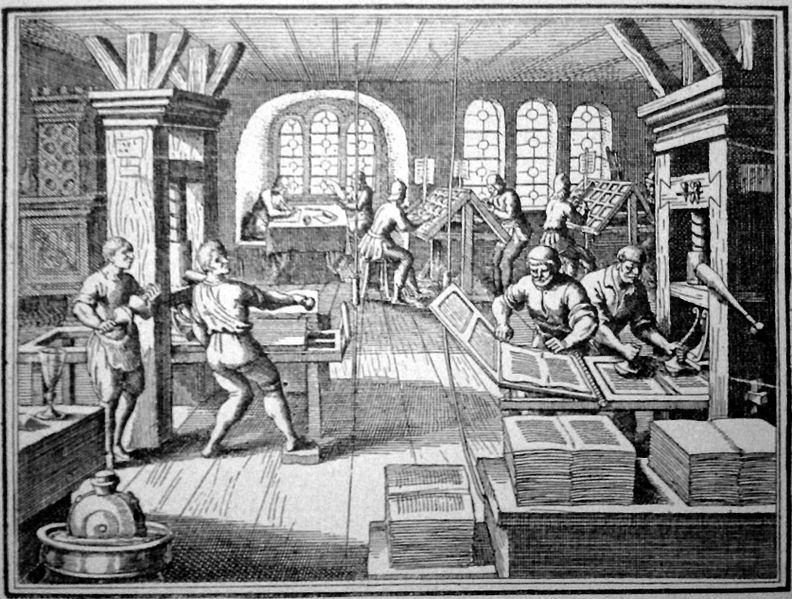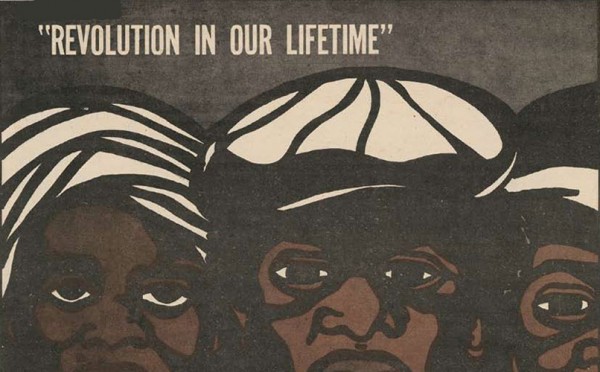The OS uses the language “print document” to differentiate from the book-object as part of our mission to distinguish the act of documentation-in-book-FORM from the act of publishing as a backwards facing replication of the book’s agentive *role* as it may have appeared the last several centuries of its history. Ultimately, I approach the book as TECHNOLOGY: one of a variety of printed documents (in this case bound) that humans have invented and in turn used to archive and disseminate ideas, beliefs, stories, and other evidence of production.
Ownership and use of printing presses and access to (or restriction of) printed materials has long been a site of struggle, related in many ways to revolutionary activity and the fight for civil rights and free speech all over the world. While (in many countries) the contemporary quotidian landscape has indeed drastically shifted in its access to platforms for sharing information and in the widespread ability to “publish” digitally, even with extremely limited resources, the importance of publication on physical media has not diminished. In fact, this may be the most critical time in recent history for activist groups, artists, and others to insist upon learning, establishing, and encouraging personal and community documentation practices. Hear me out.

With The OS’s print endeavors I wanted to open up a conversation about this: the ultimately radical, transgressive act of creating PRINT DOCUMENTATION in the digital age. It’s a question of the archive, and of history: who gets to tell the story, and what evidence of our life, our behaviors, our experiences are we leaving behind? We can know little to nothing about the future into which we’re leaving an unprecedentedly digital document trail — but we can be assured that publications, government agencies, museums, schools, and other institutional powers that be will continue to leave BOTH a digital and print version of their production for the official record. Will we?
As a (rogue) anthropologist and long time academic, I can easy pull up many accounts about how lives, behaviors, experiences — how THE STORY of a time or place — was pieced together using the deep study of correspondence, notebooks, and other physical documents which are no longer the norm in many lives and practices. As we move our creative behaviors towards digital note taking, and even audio and video, what can we predict about future technology that is in any way assuring that our stories will be accurately told – or told at all?
As a creative practitioner, the stories, journals, and working notes of other creative practitioners have been enormously important to me. And yet so many creative people of this era no longer put together physical documents of their work – no longer have physical archives of their writing or notebooks, typed from the first draft to the last, on computers. Even visual artists often no longer have non-digital slides and portfolios. How will we leave these things for the record? How will we say WE WERE HERE, WE EXISTED, WE HAVE A DIFFERENT STORY?
Even as access to digital technologies and widespread virtual publication seems de rigueur in this day and age, many countries have extremely restrictive regimes regarding internet access and publishing in any and every medium — countries where publication is indeed still seen as the radical, potentially world changing act that it appeared as so clearly to our species upon its initial invention. How can we be assured that these voices will not be lost?
What the digital world means is that we may yet be able to send these words from one side of the world to the other, where they can be published. We can network and teach these strategies widely, to communities with a huge range of backgrounds and financial ability, and we can strategize within these networks to support publication of individual and organizational voices — and we can work to assure these volumes find their way INTO THE ARCHIVE, and we can build collections and archives of our own.
Elæ Moss, Founder & Creative Director
CREATIVE COMMONS LICENSING: As part of our commitment to access to indigent communities and support of open source creative documentation, our books are printed using the most strict Creative Commons License, the Attribution-NonCommercial-NoDerivs / CC BY-NC-ND license, rather than a standard copyright. We believe firmly that those that might wish to reproduce or steal work for their own gain would do so regardless of copyright law; however, what this license does is remove stigma or threat of litigation from those now or in the future who might wish to reproduce this work for activist or community education purposes outside the academy, who might not have the financial or legal wherewithal to do so. It is a statement about the ultimate ownership of creative labor being in the hands of the people, never the law. You can find our founder discussing this radical stance in Publishers Weekly’s “Lessons from Indie Poetry Presses.”
THE TEXT BELOW APPEARS IN THE BACK OF EVERY OPERATING SYSTEM PRINT DOCUMENT:
DOC U MENT
/däkyəmənt/
First meant “instruction” or “evidence,” whether written or not.
noun – a piece of written, printed, or electronic matter that provides information or evidence or that serves as an official record verb – record (something) in written, photographic, or other form synonyms – paper – deed – record – writing – act – instrument
[Middle English, precept, from Old French, from Latin documentum, example, proof, from docre, to teach; see dek- in Indo-European roots.]
Who is responsible for the manufacture of value?
Based on what supercilious ontology have we landed in a space where we vie against other creative people in vain pursuit of the fleeting credibilities of the scarcity economy, rather than freely collaborating and sharing openly with each other in ecstatic celebration of MAKING?
While we understand and acknowledge the economic pressures and fear-mongering that threatens to dominate and crush the creative impulse, we also believe that now more than ever we have the tools to relinquish agency via cooperative means, fueled by the fires of the Open Source Movement.
Looking out across the invisible vistas of that rhizomatic parallel country we can begin to see our community beyond constraints, in the place where intention meets resilient, proactive, collaborative organization.
Here is a document born of that belief, sown purely of imagination and will. When we document we assert. We print to make real, to reify our being there. When we do so with mindful intention to address our process, to open our work to others, to create beauty in words in space, to respect and acknowledge the strength of the page we now hold physical, a thing in our hand… we remind ourselves that, like Dorothy: we had the power all along, my dears.




